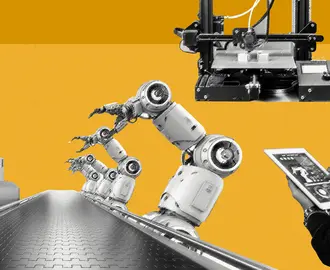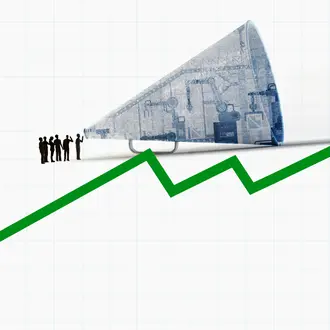Manufacturing
Amid the pandemic, private equity fortifies Midwest factories
LFM Capital’s Steve Cook on investing in manufacturing and industrial services businesses: “If you come to town in a private jet, you’ve already lost.”
Steve Cook, LFM Capital
As the effects of COVID-19 continue to ripple through the economy and put Americans out of work, it remains to be seen what the final impact will be on the private equity industry. But so far, it seems that firms still have a fair amount of dry powder, or cash on hand, ready to put to work, said Steve Cook, the executive managing director of LFM Capital, a Nashville-based private equity firm that focuses on manufacturing.
“It’s been really surprising to me,” Cook said. “It seems like other private equity firms are just bidding at this point as if nothing has changed.”
Cook, a graduate of the MIT Leaders for Global Operations program, recently discussed his predictions for the economy (20% unemployment — ouch) and what effect the coronavirus is having on his business.
LFM focuses on niche manufacturing and industrial services businesses, with factories throughout the Midwest. How has COVID-19 affected your business, and how are you keeping workers safe?
We’re still open — all of our businesses have been deemed essential. We have three factories that make high-bay racking used in warehouses and in factories to store materials off the ground. Amazon is one of our largest customers, and they communicated to us pretty strongly that they are critical and need to keep running. We have another company with a special order right now to make a new set of tools to help manufacture ventilators.
The majority of our factories are in the Midwest, in the heartland of America, but they’re mostly in lower-density locations. We’ve got quite a few in Michigan, Ohio, Kansas, Indiana, and Minnesota, but also California — they’re literally all over the country.
Our factories are such that we can really spread people out, and we’ve actually created separate zones with tape on the floor, so that people don’t go from one zone to another. We’ve added shifts. We’re proactively ordering masks for every employee to wear, just to add one more layer of protection. We’re cleaning every two hours in our factories. Anybody who can work from home is working from home. It’s nerve-wracking, but employees have been responding well.
What effect do you think COVID-19 will have on the economy?
The analogy I’ve been using since about March 10, when I first started talking to our investors, is that it’s kind of like you live on an island, and there’s been a massive earthquake offshore, and there’s a tsunami coming, and you just don’t know how big it’s going to be.
I think there will be reverberation through the economy for the next year, quite honestly. I think we will hit at least 20% unemployment. At a minimum, every company right now should assume to lose 25% in revenue for 2020, and I could see it being worse than that.
I think this will be somewhat of a V-shaped recession, but the question to answer is: What will the slope look like on the second half of the V? I think the first half of the slope is going to be steeper than anything we’ve ever seen in history.
I would say that one effect of this pandemic that is pretty clear in my mind is that living in a city is going to be less desirable. Having some space and being able to commune with nature and the affordability — I think all of that is going to drive people in a pretty significant way to look for less urban locations as far as where they live. If I could short urban real estate, I would.
Have you noticed whether COVID-19 is changing the high valuations we’ve seen in private equity?
It’s been really surprising to me. It seems like other private equity firms are just bidding at this point as if nothing has changed. There’s still a lot of dry powder out there.
When the stock market is down 35%, you have to believe that there’s a correlation between the value of a private company and what’s happened in the public markets. Generally speaking, private markets move more drastically than public markets because there’s a risk premium across smaller companies.
I have to hypothesize that many buyers will change the terms of deals on sellers as a closing date nears. In 90 days, everyone will have a better idea of how bad the seller will be affected by the coming recession. Hopefully, sellers will be reasonable and will have built relationships with their buyers, so that they can renegotiate deals before close.
You’re based in Nashville. Do you think that the location of a private equity firm plays a role in what deals they choose?
I do think that how hard a location is to get to plays a little bit of a role in whether you dig into a deal or not. If the deal’s in Washington state, it’s not going to be as attractive to us as if it’s in Ohio because we’re pretty hands-on operationally. If it takes you a day to get to the location, and a day to get back, it’s just going to be a lot harder to play that role.
I think our reputation is one of really nurturing businesses and growing them organically and bringing in really strong talent and great leadership to help take a business to the next level, and all of that is really appealing as a seller thinks about their legacy.
I would say that small locations where we operate are not super attractive to people who live in big cities because of the travel component.
I think the bigger element, though, honestly, is the comfort that the seller has. Most of these sellers, they’re running a company of 150 people. That’s a very small company, but in a small town, they might be the second or third largest employer in the town. And quite honestly, they don’t have the best perception of people from New York, Chicago, or Boston. If you come into their town in a private jet, you’ve already lost.
You named your firm LFM Capital after the MIT program you attended called Leaders for Manufacturing (now called MIT Leaders for Global Operations), which allows students to earn a dual degree MBA and Master’s in engineering. Why did you make that decision?
I wanted my company to be called LFM because the program has been so meaningful to me.
It’s a very small program; there are only 48 students a year, typically. It’s very team-based, with a very intense summer semester that I would actually say was more intense than plebe year at the Naval Academy. The fact that you’re going through that experience together brings you closer.
I didn’t really speak the language of business when I came out of the Navy, and the program taught me a totally different way to solve problems using system dynamics and statistics. I emerged with a much deeper understanding of electrical engineering. I built my own silicon wafer when I was at MIT, which is pretty rare to be able to do something like that.




